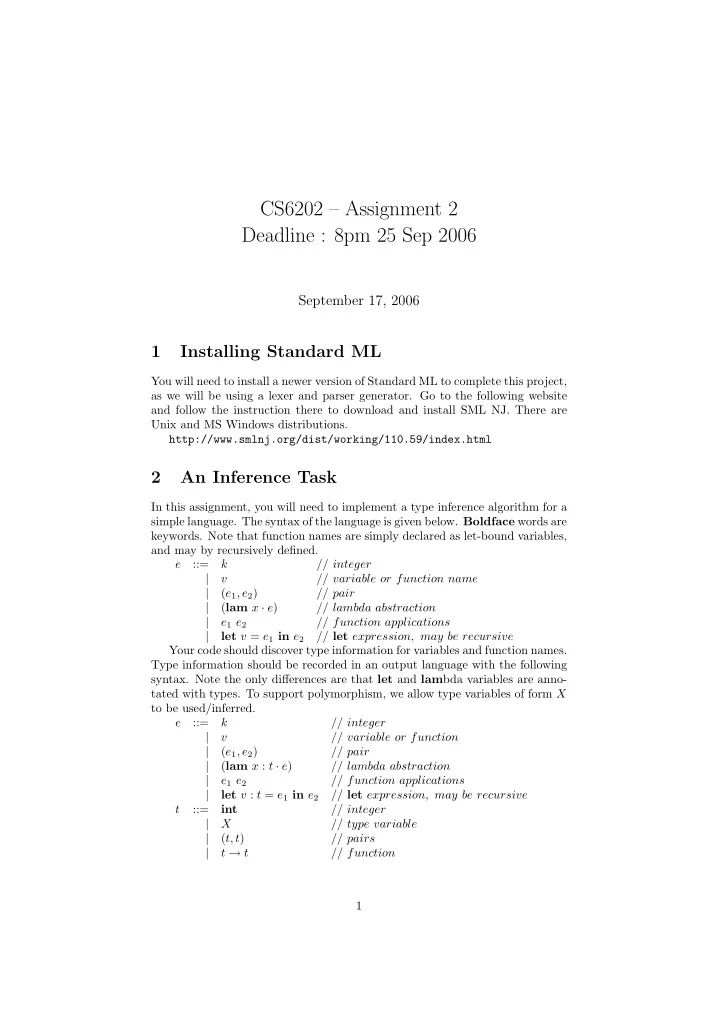

CS6202 – Assignment 2 Deadline : 8pm 25 Sep 2006 September 17, 2006 1 Installing Standard ML You will need to install a newer version of Standard ML to complete this project, as we will be using a lexer and parser generator. Go to the following website and follow the instruction there to download and install SML NJ. There are Unix and MS Windows distributions. http://www.smlnj.org/dist/working/110.59/index.html 2 An Inference Task In this assignment, you will need to implement a type inference algorithm for a simple language. The syntax of the language is given below. Boldface words are keywords. Note that function names are simply declared as let-bound variables, and may by recursively defined. e ::= k // integer | v // variable or function name | ( e 1 , e 2 ) // pair | ( lam x · e ) // lambda abstraction | e 1 e 2 // function applications | let v = e 1 in e 2 // let expression, may be recursive Your code should discover type information for variables and function names. Type information should be recorded in an output language with the following syntax. Note the only differences are that let and lam bda variables are anno- tated with types. To support polymorphism, we allow type variables of form X to be used/inferred. e ::= k // integer | v // variable or function | ( e 1 , e 2 ) // pair | ( lam x : t · e ) // lambda abstraction | e 1 e 2 // function applications | let v : t = e 1 in e 2 // let expression, may be recursive t ::= int // integer | X // type variable | ( t, t ) // pairs | t → t // function 1
Example Input program: let f = ( lam x · 2) in ( f 0) Output program: let f : A → int = ( lam x : A · 2) in ( f 0) Input program: let f = ( lam x · ( lam y · ( x, y )) in ( f 0 1) Output program: let f : A → ( B → ( A, B )) = ( lam x : A · ( lam y : B · ( x, y )) in ( f 0 1) 3 Supplied Code You are provided with a lexer and parser. You are also provided with data structure to store input AST and a simple pretty printer for the AST. The contents of the source files are as follows: • absyn.ml Abstract syntax tree • exp.grm Grammar definition file for ML-Yacc. Note that for simplicity, the concrete syntax for function application is ( e1 e2 ) . • exp.lex Lexer definition file for ML-Lex. • sources.cm CM input • link.sml, parse.sml, parse.sml Various glue code Make the directory storing the above files current working directory of sml . Run CM.make ‘‘sources.cm’’; at the SML/NJ command line to generate the parser/lexer and compile other source. Once everything is compiled and loaded, you can use Parse.prog parse to parse a string, and Parse.file parse to parse a file. Below is a sample session. $ sml Standard ML of New Jersey v110.59 [built: Mon Sep 11 11:47:37 2006] - CM.make "sources.cm"; [autoloading] [library $smlnj/cm/cm.cm is stable] [library $smlnj/internal/cm-sig-lib.cm is stable] [library $/pgraph.cm is stable] [library $smlnj/internal/srcpath-lib.cm is stable] [library $SMLNJ-BASIS/basis.cm is stable] [autoloading done] [scanning sources.cm] [library $/ml-yacc-lib.cm is stable] [library $SMLNJ-ML-YACC-LIB/ml-yacc-lib.cm is stable] [loading (sources.cm):interface.sml] [loading (sources.cm):absyn.sml] [loading (sources.cm):exp.grm.sig] [loading (sources.cm):exp.grm.sml] 2
[loading (sources.cm):exp.lex.sml] [loading (sources.cm):parse.sml] [loading (sources.cm):link.sml] [New bindings added.] val it = true : bool - Parse.prog_parse "let x = 1 in (f x)"; val it = - : Absyn.absyn - Absyn.print_ast it; val it = "let x = 1 in (f x)" : string - 3
Recommend
More recommend